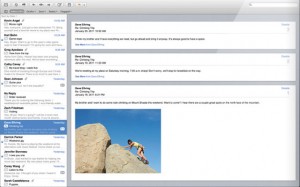Directly on the heels of developments revolving around Apple’s iOS 4 privacy concerns, Google is now up to bat. Only this time, there’s a lawsuit involved. $50 million to be exact.
Now, $50 million seems like a drop in the bucket for the likes of Google, but as with most lawsuits, it’s the point that’s more important and this case is no different. According to Wired.com, “Detroit area residents Julie Brown and Kayla Molaski filed a class action lawsuit against Google over concerns that the location data that Android devices send to Google “several times per hour” is tied to a unique (though random) device ID.” What this tells me is that people are becoming more and more aware of just what kind of personal information is getting out to the world. The irony of this is we also live in a world where we’ve never been connected more.
With Facebook, Twitter, and personal blogs and the ability to “check-in” to practically all these, does it really surprise you to find your name on Google? If we learn anything from movies these day, we should all know just how traceable the cell phone world is, so does it also surprise you that your smartphone is sending data to the companies that run the software?
Of course not! In fact, it’s not even personal data that’s being transmitted (or so they say). It’s simply location data. Naturally, when you hear such a term, your first thought is a horror story about how Google (or Apple) will always know where you’re at. This is just not the case. At least in Apple’s story, they were collecting location data in the form of cache that allows them to reduce the amount of bandwidth required to pull the same data off the same cell towers everyday. To put it in English, if you are using an app that uses location mapping, your phone has to contact each local cell tower and download some data in order for your phone to know where you’re at. Part of the process includes your device uploading some data to that cell tower. Apple was basically storing that data for you so the next time you accessed it, the desired results would come to you much faster.
The other major concern in both of these cases was how accessible such data could be should your device fall into the wrong hands. In other words, if your mortal enemy got a hold of your phone, could he/she download files that would tell them where you’ve been? It would seem that in Apple’s case, that was true—this was fixed in the latest software update. In Google’s case, the data remained on the phone in an encrypted state that could only be accessed through a root connection (which on Android phones, it’s the equivalent of jailbreaking).
Lastly, the class action lawsuit is claiming that Android devices are collecting this data every few seconds and then transmitting it back to Google every hour or so. Google claims that this data is transferred with a unique (and random) ID number that in no way allows Google to know what device the data came from or who owns it. I for one, am not worried about this. Well, actually my only real concern would be the likelihood that my battery will die much sooner with all those “extra” connections.









